Kevin James Wright / 28 years old / Baton Rouge, Louisiana / I am “agender”, but he/him pronouns are fine
Don't wanna be here? Send us removal request.
Text
The Latin Preposition “in”, and Shark Ideology
Why does the stem in English “in-”, derived from the Latin preposition in, signify both “in” as in “inside”, and “not”?
Because the perception and classification of a thing, based on its perceived representative multiple, might be in something else, and therefore imperceptible. Its existence is therefore harder to classify, since its location conceals its outward expression.
Take for example the formal statement:
“The shark is in the water.”
If the shark is in the water, then its existence may be perceived and classified as an “indiscernible”, a term borrowed from the thought of Leibniz.
In other words, if a thing is classified as in something else, does it have being, and does it have existence? These are questions which pose important challenges to the notions of truth and knowledge, and their situational interrelationship.
The established answers to these questions might have inaccuracies which affect the perception of established situations. These established answers are thereby a priori conceptions of being and existence, hence they are the foundations of a conceptual ideology.
Take for example the fact that sharks are oviparous animals that keep their eggs inside their bodies before they hatch. Before the hatchling sharks can exit the mother sharks body and begin finding prey, their only food source is to eat one another.
The fact that adult sharks may swim around one another and form social bonds and create societal systems of obtaining food for themselves is a great example of ideology: adult sharks have to behave as if their birth narrative of devouring one another as hatchling sharks never happened in the first place.
This ideology has its functional place in the water; sharks’ perception of space is subaquatic, and therefore the concept of dark matter and dark energy is omitted from their moral ideology. Light thereby becomes the foundation of the moral perception of space, and governs inter-shark laws concerning reproduction.
Humans, on the other hand, are animals uniquely suited to detect indiscernibles by inventing machines that can detect things that the naked eye cannot detect. Therefore, the characteristic ignorance which is the epistemological foundation of a moral ideology in relation to knowledge can become reduced by scientific advance. The reason for this is that we have hands with opposable thumbs that can move objects in accordance with our depth-perception, and therefore we can both build and alter concepts.
In other words, the effects of indiscernibles which necessitate ignorance in order to found a moral ideology can be progressively eliminated. If sharks could do such a thing, they would perhaps find a way to prevent their young from devouring one another: e.g, putting them in a nursery, isolating them from one another, and giving them supplementary food. All this in order to equalize the members of their own species.
21 notes
·
View notes
Text
Cogito, the function of correspondence, and existence
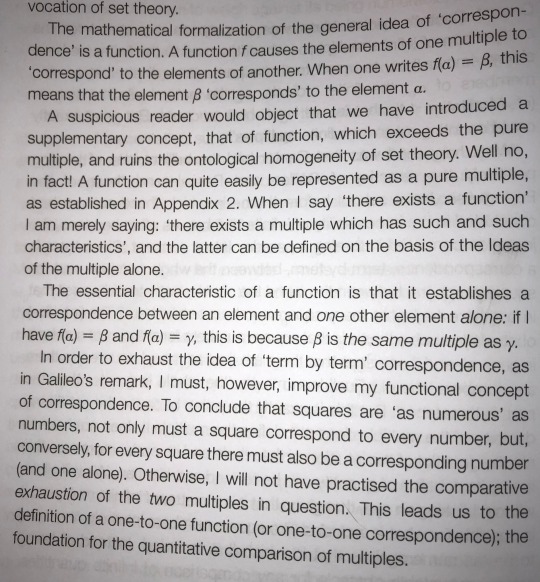
If existence may be defined as “the outward expression of a thing”, then what is the function of correspondence in the case of having 2-squared and four 2’s in the same frame-of-view (intuition)?
That a function may be said to exist means that its defining one-to-one correspondence is in the thinking of the thing (correspondence) itself, which brings its being-known into existence.
As Descartes famously stated, cogito ergo sum (“I think, therefore I am”).
The corollary for the function of correspondence in the intuition of quantity might then become: I thing, therefore I am (...what?).
This “what” is the functioning of the predicate, but it is not the predicate function. “Am” is an ontological function: the verb “to be”. A “thing” is an existential function: a thing has an outward expression. The predicate function is then none other than the “I”, an idea which Jacques Lacan coined a shorthand for: the Cogito. He claimed in his eleventh seminar that the Cogito is the most fundamental paradigm of the Freudian experience. What does this mean, however, for Badiou’s analytic of the multiple?
The pure multiple has for its outward expression that of “therefore”, but it is not a function of correspondence (which undoubtedly exists). This implies the mechanisms of the thought of the universe, which perhaps resembles Hegel’s Philosophy of Mind. However, Hegel’s ontology can be scientifically criticized as something which, in the dialectical tension between Being and Nothing, leaves out the existences of dark matter and dark energy. The “therefore” of dark matter and the “therefore” of dark energy, their respective pure multiples which have the analytic of the multiple for their outward expression, are not a singular “therefore” within the thought of the universe, however. The articulation of dark matter has a correspondence to the chemical dimension of reality, a material articulation. The articulation of dark energy has a correspondence to dark matter in the pure multiple dimension of reality, on the other hand. Dark energy and chemical matter then only have a function of correspondence in the form of a double articulation. This invests even non-living chemical matter with a fundamentally moral character, but there is not a one-to-one correspondence between this moral character and the analytic of the multiple which inheres to the physical universe’s two pure multiples (dark matter and dark energy).
The investigation of this problem may as well be humorously termed “dark knowledge”. Yet, the scientific discipline of getting language to form a closer function of correspondence to both reality and the two universal pure multiples of astrophysics (which have “the same power”, Being and Event pg. 283, as in E = MC^2) ought to yield very real logico-mathematical results.
What, for instance, is the Cogito of dark matter, precisely? It is to make energy and chemical matter have the same power between themselves. The material world is therefore existent solely within the intuition of dark matter, solely from its gaze or perspective, in other words. Dark matter is then therefore only matter-as-such within the intuition, or sight, of the Kantian conception of God. Hegel’s “objective thought”, qua knowing-itself, is the Cantorian innovation of the quantitative comparison of infinite sets applied to this notion of God. Is this notion or idea of God, however, therefore a “Dark God”, which Jacques Lacan warned his audience about at the end of his seventh seminar, The Ethics of Psychoanalysis?
I am here both ahead of my time and far behind other philosophers out there. The apparent future of theology (which I believe might be: “you don't think theology, theology thinks you!”) is what is at stake in the future of inter-human warfare, insofar as the invention of the physical teleportation of chemical matter is concerned (i.e., it is not just “quantum” of the tunneling variety). What then is the “quantum” involved with chemical matter that is larger-than-quantum if the quantitative comparison of infinite sets amounts to the ability to alter its scale by manipulating the “gaze” or intuition of dark matter, and its relation to dark energy, itself? How can reality be distorted in such a way? By involving some (pseudo-)thing like a black hole, which does not formally exist, perhaps? Its outward expression is fundamentally absent, in spite of its possessing numerical, statistical characteristics (such as mass, velocity through space, vectors of trajectory, or horizonal velocity which determines its rate of gravitational acceleration). A black hole is a physical object which has being, in other words, but it does not have existence.
I am telling people this, hopefully, for their political benefit.
— (2/16/2023)
1 note
·
View note
Text
Science, Nature, Organic Psychology (or Mythos), and Historical Narratives
In Alain Badiou’s book Being and Event, historical situations are uniquely characterized by their respective eventality. (pp. 187-200, Bloomsbury, trans. by Oliver Feltham)
There are other kinds of situations, then, in which an event of site X is either ambiguous or non-present. These situations are called natural situations, compact situations, and neutral situations.
A natural situation is one in which the nothing which the void presents within the being of the multiple, i.e. its “unpresentation”, is never distinguished from the multiple by the detection of any elements of the one which diverge from its constitutive set (the “ultra-one”). For example, the process of osmosis that occurs inside a living organism. So long as an organism remains unaware of the physical action of osmosis, its organically inherent self-consciousness (or, its compositional matter organizing itself into the open-system of its life-form) will never register the concept of osmosis as such. So long as such an organism is never deprived of water, then, it will never have the ability to become aware of osmosis, and therefore, it will never have to interpret the meaning of the need for water in any way by means of its physical movements. This is a “natural” situation. The existence in the universe of dark matter along with itself is another example. The Idea of “need” is itself unnecessary.
A compact situation is one in which the ontological schema of historical events encounters a relation of disjunction between two ideas of what constitutes a detection of the name of the void, between "{α} ∩ α = Ø" (the intersection of alpha and the set of alpha forms the proper name of the void) and "α ∩ β = Ø" (the intersection of alpha and beta, insofar as beta is an element of alpha, forms the proper name of the void). This is the ontological foundation of a narrative.

For example, the summoning of the dragon Shenron in the famous anime series Dragon Ball. Disjunction defers from the name of the void as it is derived from the ultra-one, {α}, and instead of utilizing the "Idea of the other", it opts for the "idea of the Other". This means that the event of Shenron's summoning is totally and exclusively unambiguous. All of the characters in the anime mutually agree on its objective occurrence, as well as on its respective interpretation as what unequivocally happens whenever the seven dragon balls are gathered together and Shenron is invoked. Since such a situation is compact, it is therefore mythic and its conditions are unalterable; the summoning of the dragon abides by its own law or limitation as well, that the seven dragon balls will scatter all around the world whenever the wish made to Shenron is eventally agreed upon and fulfilled. Further, since this only happens in the context of a fictional story, and the characters in the story have no real existence outside of the story's compact narrative, the occurrence of Shenron being summoned cannot be treated as a historical situation, but rather only as a fictive, compact situation.
A neutral situation is one in which the presentation of the multiple has elements which belong to it that exist on the edge of the void, thereby founding the possibility of an event, but from which no event ultimately occurs. In other words, the situation is a non-being of the event in terms of the utility of self-conscious knowledge, or historicity. For example, a symbiotic relationship between two different species of organism. The apparent interminability of symbiosis between organisms is a non-being of the event because its termination would re-form the neutral situation into a historical one. The fact that organisms must physically respond to the privation which may result from the termination of a "symbiotic relationship" is the basis of a historicity of nature qua "Nature", and the foundation of biological narratives of organismic functioning. Life-forms including those other than humans act out their respective knowledges of Nature's historicity through their movements and activities, thereby writing their own stories (so to speak) within the context of mythic events in nature through their biological footprints, and expressing the existence of their individuality as a "personal" or psyche-logical mythos.
The intersections of nature, science, and history in human societies are also expressed as not only this natural deferral from the axiom of extensionality (the Idea of the other) to the axiom of foundation (the idea of the Other), but also as biological articulations of self-conscious individuality in contradistinction to the naturally alienated character of social interaction. This is the dimension of the "psychological"; each human subject acts and thinks in accordance with a personal mythos as well as with a societal and political ideology. The interrelation between these two disparate elements is that they both constitute a series of responses to posited historical situations, which are always fundamentally fictive (if not generally and decidedly fictional or delusional).
A historical narrative is then a confluence of all these elements which interact in the "psychological dimension" for any given organism which ironically sustains its life in relation to a socius, because its physical movements and activities rely on this multiply-coded narrativization of historical situations for its very survival. It is not only the material use-value of organic matter which keeps organisms alive, but the interpretation of historical situations by way of their movements and their actual, biological existence.
— (2/15/2023)
#alain badiou#Being and Event#natural philosophy#political philosophy#moral philosophy#historical philosophy#philosophy of science#psychology#dragon ball
1 note
·
View note
Text
Lacan defines jouissance as a disturbing dimension in the experience of the body, which renders the subject unable to experience itself as a self-sufficient enjoying entity. Jouissance is immensely disruptive. It is a dimension of otherness that we all have to deal with. Indeed, the very idea of “dealing with it” bears witness to discourse;
In seminar XIX, the position of the other is described as the position of jouissance (Lacan, 1971–1972). Here Lacan defines jouissance as a disturbing dimension in the experience of the body, which renders the subject unable to experience itself as a self-sufficient enjoying entity. Jouissance is immensely disruptive. It is a dimension of otherness that we all have to deal with. Indeed, the very idea of “dealing with it” bears witness to discourse; that is, to the fact that we treat jouissance by making an appeal to an agent or semblance, which is expected to manage it: jouissance provokes the mobilization of semblance. The root of jouissance is in the structurally dysfunctional status that the body has for the human being (Lacan, 1971–1972, p. 217).
What is typical for discourse, is that it envelopes a semblance around jouissance, and as a result jouissance is no longer unlimited, but conditioned by the element occupying the position of semblance. In this maneuver, a social bond is created: “What is discourse? It is that which, in the arrangement of what might be produced because of the existence of language, makes up the function of the social bond” (Lacan, 1972, p. 51, my translation).
Stijn Vanheule - Capitalist Discourse, Subjectivity and Lacanian Psychoanalysis. Front. Psychol., 09 December 2016, Sec. Psychoanalysis and Neuropsychoanalysis. Volume 7 - 2016.
19 notes
·
View notes
Text
(Useful) Definition of "Perversion"?
From a perspective of simple intuition (looking at something), perversion presents itself as a duality of interpretations. There is the more "conventional" interpretation of things (reminiscent of a sème), and there is also the alternative one, which can solely be possessed by or attributed to an individual person. If someone is "perverted", so to speak, it is because their interpretation of something is unconventional (rather than "normal"). That is mostly for analytical parlance, I'm deciding, but it functions in a similar way as a colloquialism.
How is it, then, that perversion becomes "erotic"? It is when the unity of two unconventional ("perverted") interpretations of something is an actual or evental coincidence between two individual people. Take for example Tom Hansen, the main character of 500 Days of Summer. His delusion about love springs from the belief that his co-worker Summer holds the same unconventional interpretation of the world around him through their shared interest in listening to The Smiths (so much in common!). The point of (or message from) the film, then, is that his perversion towards the outer world is expressly not erotic; his love-interest simply does not share the same interpretation with him. There are themes of castration (symbolic lack) all around: the lack of unity of the structure of Tom Hansen's fidelity to Summer with the structure he wishes to effect in the world around him with his ideas about architecture, as well as the lack of unity between Summer and the rest of the world in general for Tom Hansen.
Although, it looks like I have only provided an example of a "perversion" that is not erotic, rather than one which is. It is much better than the example which first popped into my head though, that of the "fetishism" of the "phallus" in "homosexuality", words which all require scare quotes here since I have finally introduced myself to Alain Badiou a little bit. (I can define them all, but I feel radically disunited from their respective definitions in thinking them, somehow, because these signifiers are hegemonic to me.) However, what can (offensively) be called "perverted" about homosexuality is an unconventional interpretation of the utility of the phallus. This cuts reality off from castration, so to speak, because it forms a psychological blockade against symbolic lack, and the subject of the schema L which traverses the graph of desire ("S") becomes trapped in a relay loop between the signifier of the barred Other and the subject's relation to demand.
This is clearly not a "sickness", however. If "pathology" is the medical study of suffering and its diagnostic causes, then any suffering that can be attributed to "homosexuality" ought to be attributed wholly to the phylogenetic conditions of human existence which antagonize the ontogenetic development of an individual person's sexuality, which can only and very simply be "genetic". In other words, it is the society around us which is constructed on top of hetero-patriarchal norms that is the source of any "homosexual" suffering in the first place. Today, this certainly gets addressed, yet never quite fixed. (I think it mostly has to do with humans' mammal-status, to be honest.)
0 notes
Text
Objects (or Subjects?) of Repression and the Unconscious in Reasoning via the Absurd
From p. 263 of Being and Event:
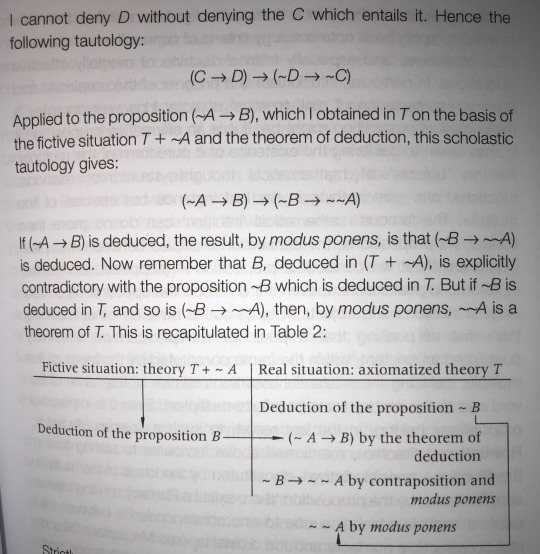
To my eyes, this strongly resembles the “ambiguity” that I have been confused about for a good while about the fact that “repression” is something that you are very fundamentally aware of. To “repress” an urge of some kind is to notice it initially, but to stop yourself in spite of it. This was/is the very clear and simplified meaning of the term “repression”, even prior to the invention of psychoanalysis, but this meaning falls short of the full set of implications that result from it. Hence, psychoanalysis emerged as a discipline of thought which sought to unify a theory of consciousness in relation to this bare, minimal fact, that we are obliged to repress certain urges in order to become and remain a civilized species.
The figurative event of the subject, then, is the object which so-called “primary repression” (in contradistinction to “auxiliary repression”) repressed to begin with. All apparent “theories” that come to mind throughout one’s life after the perceived mastery of discourse (language acquisition) has occurred are therefore references to this key starting-point, or theories of the subject.
Subjectivity in the Christian Era (Anno Domini), for example, is something permanently altered in its structure in comparison to notions of subjectivity which circulated in pre-Christian civilizations. The main difference there is that in the Christian Era, the notion of the subject is unified under a singular, repressed object, that of the word, of the signifier, of the abstract concept of the unnameable event which gives to subjectivity its linguistic precepts. Albeit, this is in the form of a minimal correspondence. Hence, ~A represents the human subject of our civilized species; ~~A is the evental figure of Christ which determines much of the structure that surrounds the notion of our subjectivity.
1 note
·
View note
Text
Genuine Infinity or Matheme of Infinity? The Ethical Specificity Absent from Philosophic Discourse
The resemblance of genuine infinity from the Doctrine of Being (in The Encyclopaedia Logic) to the rule of passage for natural multiples to be substituted for their successors deserves to be closely studied, since that is probably where Alain Badiou found the Idea for the matheme of infinity in the first place. It's quite extraordinary that from a physical object, we can derive and isolate all of the logical elements necessary to form an equation for infinity. Yet, the pitfall of ideal-ism is that the signification of words must stick very closely to the signified (as in Plato's Symposium, where a single word "love" can be democratically re-interpreted by anyone in the conversation, since it is treated as a word to be unconditionally universal in the first place) in order to evoke a certain alternate effect brought out by the use of a philosophical register of speech. Thus, in the Doctrine of Notion, the formulation of syllogisms involves arranging letters, e.g. I–P–U, to enact the syllogisms of the understanding that pertain to objects, yet, these objects' respective categorizations end up as products of speech which exclude the mathematical variability of elements. In other words, objects in Hegel's philosophy appear to lose their fundamental specificity in becoming syllogized.
That works perfectly well for the field of Lacanian psychoanalysis, especially for its dictator-in-chief, who always valued the effects of a Hegelian dialogue on an audience forced to feel unsure of either sinking or swimming along with him.
Alain Badiou is a bit more admirable along these lines, in my opinion. But that is because his purposes are fashioned quite differently, from what I can tell. In Jacques Lacan's style of monologue, the mathèmes may have been on the board, but the effect of his speech is to make it ambiguous whether you are the one who is reading the mathème, or if the mathème is the one reading you. When one is following along in Being and Event, however, the specificity of elements is incarnated in their algebraic expressions in a way that is explicitly non-contradictory to the axiom-schema of substitution, an area of knowledge that Jacques Lacan now seems keen (to me) on roping-off to people on purpose.
Does this mean that Alain Badiou always had very different political goals in mind for the future of contemporary human modernity than did Jacques Lacan? Or did Alain Badiou understand Jacques Lacan as a very particular human figure, only capable of representing so much? Alain Badiou acknowledges something very fundamental with the writing of his axioms in terms of set theory, namely that the foundation of an ethical relationship begins with the exchange of factual (and therefore useful) information, or its articulated un-concealment. This is not only a sign of care, but one of love and protection that freely gives the possibility of intellectual independence to the reader or listener. It is not a process of training an audience to be able to listen to something dreadful and neverending that resonates with the structures of a Freudian dreamwork, in other words. (For this reason, I have come to feel biased against the Lacanian emphasis on dreams quite a lot now.)
— (1/15/2023)
3 notes
·
View notes
Text

The Matheme of Infinity.
From Being and Event (p. 166).
3 notes
·
View notes
Text
Eros in Nature and Jouissance as the Ontological Schema of the Two: Applications to Psychoanalysis and Psychiatry
I believe, if I recall properly, that Sigmund Freud formulated Eros as “the unity of two”. This is by far its best definition, whether or not anyone likes the term, but it’s not immediately clear what this implies.
In Meditation 12 of Being and Event, “The Ontological Schema of Natural Multiples and the Non-Existence of Nature”, Alain Badiou gives us the ontological schema of the Two, which applies to multiples (here re-christened as ordinals) in natural situations:
{Ø, {Ø}}
If living things suffer from their own bodies, it is because what ought to be unified in the form of a total physical safety for their organism is not unified within a natural situation at all. Nature itself is just such a situation.
The ordinal of having two arms, for example, is not the same any longer if one of them gets damaged or lost somehow; not all animals have the same regenerative capacities in common. In this sense, starfish are closer to subsiding in a “natural situation” within their own bodies than other animals are. This means their relationship to jouissance differs collectively as a species from those of other animals. Therefore, they have a different “psychology”, so to speak, since what defines, for the perception of the outside world of a starfish, a belonging-minimal ordinal that is capable of being described by a property (Ψ) belongs to a different order of affects.
In any case, the expansion of psychoanalysis into scientific consciousness towards its eventual dissolution hinges on the philosophical progress that is contingent to our current historical time. In the United States, the general poverty of scientific understandings of so-called mental illness has never been clearer if people admitted to a psychiatric ward do not receive any proper psychotherapy/one-on-one counseling, nor does the doctor even get a CT scan of their brains to see what they physically look like, for that matter. The very concept of “mental illness” is thereby becoming more and more politically abusable, because its discursive ordinals can be re-arbitrated depending on the situation in order to manipulate that situation’s state. If mental illness is a finite set of diagnoses considered “scientific”, then what, precisely, are its natural multiples? Psychiatric ward patients and their doctors are unlikely to ever find out at this rate.
Since human bodies discover themselves from an early age to be in a perpetual state of severability, the “unity of two” that defines the notion of Eros is constantly under threat without the semblance of psychological stability. This stability is derived from jouissance, since enjoyment provides a continuous supply of perceptual input with which to maintain it. What enjoyment does, then, in relation to perception, is it causes our cognition to operate using ordinals taken from the semblances of Nature, which in turn gets us to understand the ideas of axioms that relate to perception in a logical way. “Enjoyment” can then be organ-ized into an effective mode of regulating one’s perception in proportion to physical and mental activities, which furthermore come to be socialized by means of the gravitational point of “castration”, or the renunciation of total satisfaction (in favor of part-ial satisfaction) that makes the severability of our bodies more fundamentally tolerable.
What this means is that the “advancement” of psychoanalysis (this time meaning psychiatric science) depends upon the therapeutic potentials of getting a patient to recognize the relative mistakes that they have made thus far in their lives with organizing enjoyment in accordance with the ontological schema of natural multiples. This is forgivable though, isn’t it? As mentioned earlier, the human body is not a logically-comprised “natural situation”, as Badiou defines it. The philosophical challenge for psychiatry, then, is to analyze the anatomical structure of the brains of psychiatric patients, while also observing how corrections in the organization of enjoyment in their lives corresponds to this structure; how these patients’ improvement overall corresponds to the ontological schema of natural multiples is the real horizon of medical science and psychological health today.
— (1/14/2023)
#Alain Badiou#Being and Event#psychiatry#psychology#jouissance#lacanian psychoanalysis#mental health
4 notes
·
View notes
Text
Badiou and Spinoza: Errancy of the Void and the Psychogeography of Abrahamism
I wonder if you can read Badiou’s Meditation 10 on Spinoza as a critique of Islam. It seems almost like an affirmation that Spinoza is less Judaic than he is Islamic, if the substance that God’s structure determines is immanent (present everywhere and in everything, albeit in an “infinite mode”) to the thinking of what is singular.
Yet, the separation of thought and extension in Spinoza’s philosophy is more reminiscent of the dualism that characterizes the relationship between Moses and Aaron in the Torah.
However, doesn’t Mohammed in the Quran allude to the Torah as “Scripture”?
To me, Mohammed’s critique is not of the structure of God, as it is interpreted in either Judaism or Christianity, but rather of people who are “infidels”, preachers and rabbis, who do not “believe” in reading Scripture (the Torah) to the letter, and who bicker amongst themselves about the identity of God instead.
Hence, the political intervention of Islam was to put God in everything rather than into a singular Messianic figure.
However, such a theological conception of existence apparently “forecloses” the errancy of the void. In a maneuver that seems to outmatch the antinomy of reason described by Immanuel Kant, that of the infinitude of an “uncaused cause”, Badiou’s meditation on Spinoza calculates the void to reside in the discrepancy of perception as it regards the substance of objects. Doesn’t the void also belong to God if God is properly true to his own name?
God’s testimony to his own name thereby is the object of Judaic and Christian faiths.
The European continent and the Mediterranean region are also therefore the site of these philosophical and theological innovations that influence the basic politics of both China and the Americas alike, landmasses that are obviously relatively far away from the Middle East.
Why?
In my estimation, it is the geographical diversity of a region which inspired (and still inspires) these views on God and physical substance as they figure into the general political ideology of a nation. (If China is Marxist so-called, doesn’t that also make it a European country?) Arguments of the Nordicist variety of the supremacy of European philosophy may thereby be put to bed.
What turns this dialectic of psychogeography, religion, and politics is the realization that imaginary lack in Lacanian psychoanalysis is not just the imagined disappearance of objects in our outer intuition, but also the mode of defining the physical contours of objects, such as mountains, coastlines, numerical figures in terrestrial geometry, and molecular structures in chemistry.
#Islam#Judaism#Christianity#psychogeography#alain badiou#Spinoza#theology#ethics#geopolitics#lacanian psychoanalysis#Kant
2 notes
·
View notes
Text
(Part 2 of 2, On Letters γ and δ)
On Letter “γ”
The Speculative side of logic for Hegel might be best informed by Badiou’s commentary on the “axiom of separation” in the Zermelo-Fraenkel system of set theory. Although the proper name or “mark” of the void, Ø, is what opens up fundamental problems with using a set of γ as it defines any potential properties/limitations of existence (without ever predicating anything in terms of objective characteristics) by means of the impasses of belonging (∈) versus inclusion (⊂), we can still posit based on the text that such a set, λ(γ), is the absolute precondition of the implied existence of β. This position (or positing) of λ(γ) is a product of positive reason, which bears similarities to Kantian scepticism, namely, that the thing-in-itself is independent of its outwardly sensible expression as something noumenal, which is also conceptualized in the imagination without the need for inner intuition.
In other words, the implied existence of β is what we can already become certain of once we have gone through the processes of language acquisition; but, since β cannot rationally exist without first positing λ(γ), the set of all possible elements and/or subsets of α, we are never quite systematically certain of its existence (as a perfect computer-consciousness with immaculate AI capacities otherwise would be). This existence (∃β) is a truth that may only be assumed by a subject with a priori ontological capacities for relating to language, which are themselves the serendipitous product of a sort of testing procedure with regards to objects, passed down to now-living humans by their genetic predecessors.
The ontological status of γ, then, is a pure being-multiple in respect to λ(α). The minimal hope of ever moving “beyond” psychoanalysis has its foundation here, since desire as an object of interpretation has become seemingly outdated due to the impact of advances in artificial intelligence on global human civilization. The formulation “desire is the desire of the other” has a multiplicitous ambiguity here. In other words, the other, the object a, is converging onto the Other of scientific knowledge. (Alain Badiou’s philosophy anticipates this trend magnificently.)
Here is a passage from the sixth volume of Jacques Lacan’s seminar, Desire and Its Interpretation:
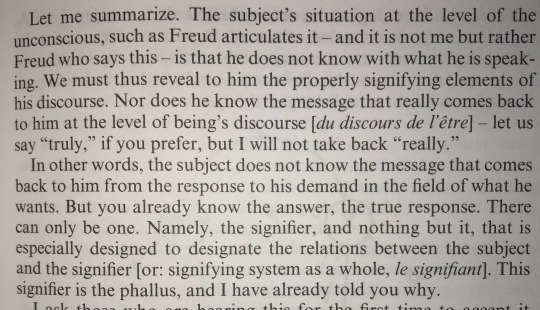
In the preceding comments (from On Letter “β”) about the letter α, I referred to it as constitutive of a bare signifier, speaking of it with regards to the phallus as the “mother’s α”. It is curious that the form in which a signifier can appear or reappear to the subject by means of utilizing a message, γ, as its vehicle is so rich with ontological multiplicity that it exceeds the typical capacities of a structured-multiple (unlike α).
The phallus, or the pure phallus, which is to say, the phallus without being written as a minus-phi, designates this multiplicity precisely. Qua signifier, its presentation takes the form of a maternal-phallic register of truth. Qua letter, the image of the mother, i, becomes the image of the other, i(a), and the mother’s α fulfills this function only in the context of a message that is received by the subject in an inverted form. This is because of its ontological capacities as an algebraic letter that exceed the general capacities of either an “other” or an “object”. Yet, a letter is not a linguistic form, properly speaking (unless of course it coincides with being a word). Rather, a letter is a bare indication of symbolic lack, which has its own mechanisms of slippage when it comes to the anxiety that arises in response to the possible refusal of a demand for knowledge from the mother (at the signifier of the barred Other).
Furthermore, to echo the above passage from Lacan’s seminar: “Nor does he know that the message [truly] comes back to him at the level of being’s discourse.”
Luckily for the prospects of having one’s demands for knowledge honored and met by the phallic mother at the space where the object of privation, x, has been ejected in favor of inner intuition, a “letter” and a “level” are two separate arguments. A level is not an indication of symbolic lack, but rather a site (with a specific numeric elevation) of paternal knowledge and sexual desire which undergo temporal exposition or unfolding whenever inverted messages received by the subject fall into relation with perceptions of language through encounters with discourse. A new modality of message (γ) is formed thereby, one which can be amply intercepted by discourse, whether it belongs to being or it belongs to symptoms (knowledge-lacking-being).
Thus, unlike the preceding interactions between these Greek letters which have not been very neatly ordinal at all whatsoever, γ seems to require a δ, the letter directly succeeding it in the Greek alphabet, since it functions as a representative of the set of all the possible elements of α, and which in turn may suppose the dubious and elusive existence of β (this, to me, is one of the most sophisticated Ideas).
On Letter “δ”
Discourse, even in Hegel’s philosophy, is not itself subjected to logic. Thus we hear that “the signifier is arbitrary”; from a Fregean perspective, Saussure was right. So long as a symbol is there to fill an empty argument, the requirements of a discourse have been met. It is not clear, however, what a symbol, on its own, signifies for discourse itself.
A symbol can represent symbolic lack through its perceptible presence (threatening the speaking-being, parlêtre, the “I”, thereby with a poverty of understanding in the absence of any language); or, a symbol can present symbolic lack through its disappearance, in other words, by means of another representation of symbolic lack that is not the same (representation). The former is more colloquially associated with the psychoanalytic notion of castration. For the latter, it suffices to point out that two identical arguments can be unique without being genuinely “different” from one another, since they are both singular and mutually congruent; yet, they are not precisely the same as one another. (The definition of a commodity in Marxian economics is another application of this principle.)
— (1/12/2023)
Being and Event: The Point of Excess, Hegel's Logic, and the Name-of-the-Father (part 1 of 2, On Letters α and β)
Intro: On Writing “The Name-of-the-Father”
I normally choose not to use hyphens when writing out the term borrowed from Lacanian psychoanalysis, “the Name-of-the-Father”, because it looks precocious and it feels unnecessary; however, for the purpose of explaining and unifying the usage of Greek letters in Hegel-and-Badiou’s respective writings, I am obliged to include them here in the writing out of the term.
One can assume that the hyphens themselves carry out a clever function, that of putting several words together into a singularly understood and inscribed Word (“Name-of-the-Father”) that signifies a signifier for all the other signifiers, or a one-word for all the other multiple-word(s) which are also words that exist on their own, both alongside it and without it. Perhaps, then, the Name-of-the-Father is truly either “Lexicon”, “Language”, “Vocabulary”, “Dictionary”, or maybe even “Word-Bank”. Anything like that. But my personally-chosen approach to psychoanalysis is more emphatic about the future relationship of psychoanalysis to philosophy, and therefore, a primacy of the signified emerges over the signifier as the multiple of active agents which ought to be used for understanding both “existence” and “reality” simultaneously, if psychoanalysis is to possess any political usefulness at all.
First, examine this important passage from “Hegel’s Logic” (p. 113, Oxford University Press):

Is this not basically the same iteration as what Badiou terms “the theorem of the point of excess” in his conceptualization of Russell’s paradox?
Furthermore, one gets the impression from this comparison that the Greek letters used to write the theorems in Being and Event also possess properties unique to themselves, albeit only in relation to one another.
In conjunction with the concept of the Name-of-the-Father (Nom-du-Père), this observation finds its highest realization in philosophical principles derived from the grammatical mechanics of a written language. Examine the following passage from Being and Event (p. 87):
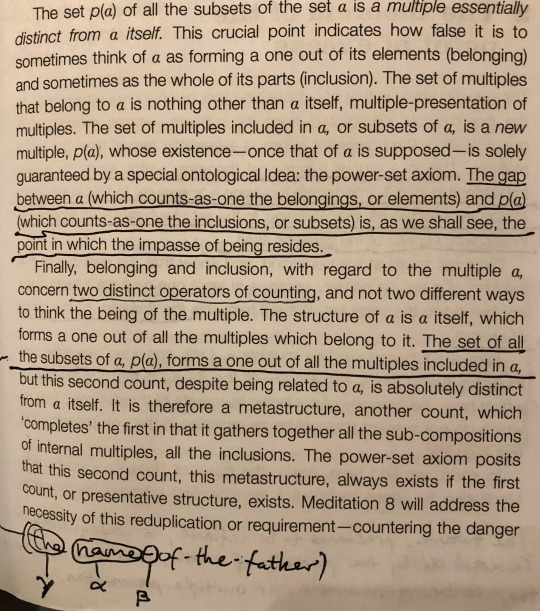
The resemblance to the concept of the Name-of-the-Father stricken here by the notation Alain Badiou uses in Being and Event, p(α), yields a linguistic analysis of the text that is indispensable for incorporating ideas from Hegel’s philosophy into a critique of psychoanalytic terminology that might have concretely political applications later on. Hegel’s philosophy, once it is finished giving its account of human history (which for him is also the history of philosophical progress throughout a living civilization), can commence with its more substantial and holistic analyses of logical thought, so as not to “give an inadequate conception of them”, as Hegel might put it.
However, Hegel wasn’t entirely “right”, was he? If human civilization had finally finished progressing philosophically, as Hegel hypothesized it ultimately would in a Napoleonic Europe, perhaps his Philosophy of Right would have been published a bit sooner, and democratic human rights would already have become universally granted to all without exception. We must consequently look towards more contemporary thinkers in our own present-day.
The Letters Themselves (α, β, γ, δ)
On Letter “α”
The philosophical or logical principle innate to α, then, is the “Abstract side” of logic, that of bare understanding. It is encountered in the very functioning of a “Name” so-called. This is a functioning that is simultaneously both different-from and identical-to that of a signifier, which in writing can take the form of either a word, a name, a title, a pronounceable character, a character that is never pronounced when reading (a notion of writing derived from the logical functionings of a given language’s various parts of speech, such as a comma or a semicolon), a symbol, a signal (a signified of the signifier that is unconscious), a part of speech (a signifier of the signified that is unconscious), or a void (either read-as-silence or a physical “space” between signifiers that separates them qua appearing as something-zero).
In other words, history is something understood a priori within any given dialogue as already-written, but it is not something that is capable of interpreting itself in the mere act of becoming-read. Unlike the logical functionings of particles of grammar and language, which lead the thinking subject towards the conceptual completion of speech by means of their internal mechanisms of (a seemingly Kantian) necessity (i.e, the rules of forming a complete sentence), historical exposition must avoid taking on any kind of subjectifying narrative if it is to remain as something objective and factual. In other words, already-written history is something that can be investigated, or even revised, if needed.
The condition of this intrinsic revisability is only that it must never become interpreted by means of its very own exposition. Otherwise history becomes more like a Netflix series (I’m thinking of The Dark Crystal: Age of Resistance) or something similar. This principle of historical exposition is continuously causing problems for the relatively nascent field of anthropology, for example, and causes even more problems for more contemporaneous (synchronic) fields such as law enforcement, forensics, and political legislation, which must always stay abreast of what is currently happening.
The side of logic Hegel called “Abstract”, that of mere understanding, is therefore highly duplicitous. The letter α only exists on its own, then, in the form of p(α), a letter “p” which alludes to Bertrand Russell’s paradox of set theory; this paradox states that a given set, written by Georg Cantor as λ(α) (source: Badiou, Being and Event, p. 42), can contain anything except itself (as an element). In other words, p(α) is identical to α, but qua set, it cannot include itself as an element, and this is not only a logical law for analytic philosophy, because it is also considered as a law of nature and a law of physics, so to speak, for any scientific ontology.
On Letter “β”
What is innate to β in Badiou’s theorems is what Hegel termed the “Dialectical” side of logic, or “negative reason”. This (β) is the argument whereby the distinction between belonging and inclusion is introduced by means of an other argument besides α, namely γ. It is called the “power-set axiom”, which states that if any set of any argument exists in the first place, it also belongs to a different set, designated as β, by means of its elements necessarily falling somehow into a relation with γ, another different set. The set of (all) multiples that actually exists, α, also founds the existence of the set of all multiples which can be inferred from α’s respective elements and subsets, that of β, solely and exclusively because of the inclusion of γ in α.
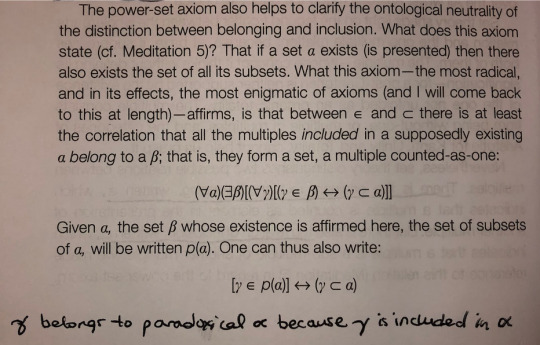
Inclusion relation: ⊂ (“included in”)
(source: https://lexique.netmath.ca/en/inclusion-relation/)
Membership relation: ∈ (“belongs to”, or, “is an element of”)
(source: https://lexique.netmath.ca/en/membership-relation/)
Universal quantifier: ∀ (“all”)
Existential quantifier: ∃ (“there exists”)
(source: https://lexique.netmath.ca/en/quantifier/)
Power-set Axiom:
(∀α)(∃β)[(∀γ)[(γ ∈ β) ↔ (γ ⊂ α)]]
As Articulated:
“For all α there exists β, but only such that for all γ, γ belongs to β because γ is included in α.”
I will add two (rhetorical?) questions to accompany this information: is there any more perfect way of writing out the concept of Absolute Knowing in Hegel’s philosophy? Also, should the third “side” of logic perhaps precede the second “side” of logic if γ is more fundamental to constituting α than β is?
As these Greek letters in Badiou’s written theorems also serve as “moments” of logical entity (according to myself), then, we maybe get some crucial insight into the synchronic grammatical constitution of complete sentences, and the informational entropy which is generated from the understanding of the signified that is undertaken by the Lacanian (barred) subject in either reading any text or listening to spoken language. For example, in the formula of sexuation written (∃x)-(Φx), or, “there is One who is not submitted to the phallic function” (I am utilizing a hyphen as a minus-sign in place of the horizontal bar usually written over the top of “Φx”), we can glean that a sentence, even if it is grammatically correct, may also approach an infinite length in its being-articulated. A long list of names read aloud at a graduation ceremony or a veterans’ memorial service are examples of this formula as it can be applied to actual speech. The monologue of Leopold Bloom’s wife Molly in the last section of James Joyce’s novel Ulysses is an example of the formula as well, since it can also be applied to written/printed literature.
What this means for the interpretation of the theorem is that the Lacanian “little other” (in contradistinction to the big Other, “A”, in French, Autre), also called in English “object a” (in French, objet petit “a”), is an “other” α only in the form of γ. This applies directly and precisely to something that Jacques Lacan presented in the fifth year of his seminar (1957-1958), titled “Formations of the Unconscious”, on the interactions between messages and codes which are constitutive for the functioning of a metonymic object. This was called the two functions in a sequence of signifiers, which I interpreted to refer to the processes of “coding” and “re-coding”:
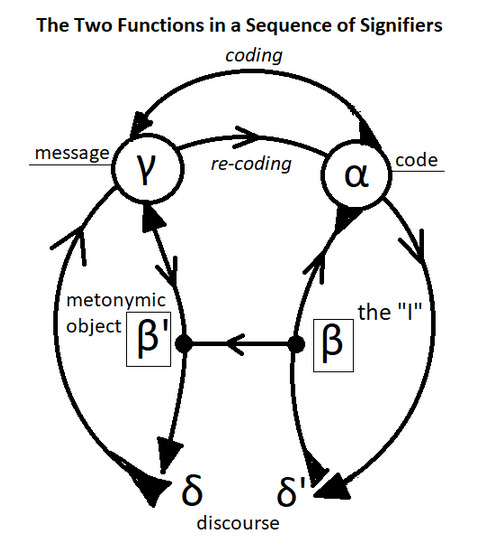
Since the properties of α are found in the functioning of a Name, it is far easier to make a list of the possibilities of the forms taken by α as they occur in writing than as they occur in speech, since speech frequently overlaps with the anarchic qualities of auditory perception in general. However, the properties of β complicate what is encountered in the written forms of α precisely because of the relationship that a Name necessarily bears to a metonymic object. The bare recognition of γ precedes any “Dialectical” understanding of language itself, insofar as a human child’s biological birth-event is a prerequisite of possessing any subjectivity in the first place. This further implies, of course, that language acquisition, as it relates to any bare understanding of language, begins at zero, at age zero, and possessing (a) zero understanding of anything. In this way, language becomes an immanent metaphor (immanent to our reality) for perception itself, since the “transcendental unity of apperception”, as Kant termed it in Critique of Pure Reason, must be forcibly synchronized with the fact of language’s existence; this is a fact which constantly asserts itself by means of languages’ practical usage in our real, social world of shared perceptions.
In turn, language not only codes and re-codes elements of α through the economics of discourse (via the real exchange of signifiers), but it also de-codes our sensory perception(s), and it does this by using Kantian cognition as a mediator, or as a kind of referee, of consciousness. Thus, the signification of a word is not the result of a unitarily understood signified; rather, signification is the result of multiple-signified(s) that are strictly unconscious, and move the forever-nascent subject towards ego-ideal formation, propelled by the cyclical economics of discourse in language acquisition. This specifically means the recognition (β) and identification (β’) of grammatical parts of speech as they present themselves in the usage of language (α), and how they interact with the Hegelian moments of logical entity through the multiplicity of γ.
Parts of speech (a signifier-of-the-signified that is unconscious): ego-ideal i(a) formation
Itinerary:
α → β → β’ → γ or δ
While it may seem that because the ideal-ego, I(A), is located at the dead-end of the Lacanian graph of desire at the lowest left position, the formation of the ideal-ego must therefore be a more mature process that happens later on in language acquisition than the formation of the ego-ideal, it is perhaps more true to state that the ideal-ego originates for understanding from the blank image of the mother, i, a point which is located on the pre-Oedipal triangle between M and -φ. In this way, understanding proceeds apparently from nature, from Nature-proper, and not directly from the de-coding processes that cognition uses to mediate the self-same consciousness that cognition also necessarily inherits some duty towards interpreting.
Signals (a signified-of-the-signifier that is unconscious): ideal-ego I(A) formation
Itinerary:
δ’ → β → β’ → γ or δ
Negative reason, or the Dialectical side of logic, defaults here from a reliance on language and the logical/affective entanglement with grammatical parts of speech to a philosophical form of cognition experienced as something more primally universal than speech. It is therefore implicitly understood to exist prior to the appearance of the mother’s image, i, within the subject’s relationship to language. In this acquired sense of cognitive difference, it becomes possible to register the phallus (on the pre-Oedipal triangle) as something more like the mother’s α. The desire of the mother, which transforms the “I” into a grammatical part of speech which is always present within speech even without its appellation, originates from the metonymic object which can be located in any sequence of signifiers, and whenever δ’, a signifier of language which seemingly proceeds from Nature, is understood as the initial trigger or catalyst of the mother’s desire, an anxiety develops that is foundational for ideal-ego formation probably a while before ego-ideal formation is ever encountered.
— (1/10/2023)
13 notes
·
View notes
Text
Side-Note: What is “Sexual Orientation” to “Sexual Desire”?
The backwards ideal of a patriarchal utopia is no longer thinkable, let alone possible. Whatever happened to the cissexist notion of universally identifying ourselves with the concept of a patriarch? It is now irrevocably deposed, and for the better. First there was “gender trouble”, as Judith Butler coined it, with the broad-ranging and long-enduring political interventions of feminism, then there was “sex trouble” with the cultural interventions of psychoanalysis; but then there was (and still is) gender trouble again, it would seem, with the category of “sexual orientation” now identified as an indispensable and universal element of our personal individuality. (I’m a gay man, by the way).
In my own estimation, the instinctual urges that are linked to the sex act, I will call it, are a product of our individual genetic makeup. These urges result solely from the materially-derived organic chemistry that is intrinsic to the human body. That much about it is also fundamentally phylogenetic, as opposed to human sexual ontogenesis, which can become susceptible to behavioral conditioning. Sexual orientation, then, is something that is originarily exterior to individual people themselves, and therefore must be imposed as a concept onto civilized etiquettes of sexual conduct from outside.
Where does psychoanalysis come in for the framing of this problem of sexual orientation, especially given that psychoanalysis is notorious for its history of harboring unscientific and homophobic medical prejudices towards human sexual behavior?
The answer is that it is the structure and the culture of the society around us, whether it touts the (wholly beneficial) gospel of sexual orientation or not, which still retains Oedipal residues of the paternal and maternal superegos, due to the nature of the transmission of cultural and scientific knowledge being necessarily very generational. What is most curious about sexual orientation, in contradistinction to feminism, broadly-speaking, is that it has instigated a diffusion of both maternal and paternal superegoic/ Oedipal residues (which still cling to sexual desire) into the political sphere far more effectively.
Instinctual urges linked to the sex act are inherently bound-up with the order of the signified. Therefore, what has now become more destabilized and multiplicitous is the very lexicon of possible signifiers that are socially permitted to trigger our sexual urges in the first place. Yet, even this newly expanded order of signifiers remains relatively oppressive. The infamous “prohibition of incest” which governs the usage of signification in the signifying economy of any given culture prohibits not actual incest, but rather the encroachment onto the dimension of castration wherever and whenever sexual desire is involved (or otherwise implicated). In other words, independently of even the prescriptions of “sexual orientation”, it is not always appropriate to desire other people (who are typically one’s own neighbors) in a sexual way. In this regard, the paternal superego comes into play, insofar as Knowledge-itself possess even its own laws of segregation and distribution for itself. Through the very existence of sexual desire, our species is forevermore submitted to this.
In other words, desire, taken by itself, is something that can be received and understood a lot more optimistically than sexual desire. This is because desire-proper necessarily possesses some minimal quanta of theological elements which are indispensable for the universality of natural understanding. This perhaps exhibits a strong resemblance to Spinoza’s ethical philosophy of affects. (However, his ethical system is a bit too concentric and ordinal-seeming to really correspond to the anarchic affects of desire’s very own philosophical exposition within the mechanisms of historical progress, from what I can glean.)
— (1/11/2023)
#Spinoza#lacanian psychoanalysis#desire#sexual orientation#sexual desire#human sexuality#political theory#ethical philosophy#affect theory#Judith Butler#gender trouble#psychoanalysis#anti oedipus#theology#philosophy#feminism
0 notes
Text
On the Genesis of Sexual Desire
My hypothesis here is that “sexual desire” becomes created whenever repressed elements of the unconscious (signifiers) approach the knowledge that belongs to the paternal superego either in being thought (“I am here”) or from being articulated (“I love you”), without, of course, having any prior knowledge of what that superegoic knowledge of “sexual desire” truly is.
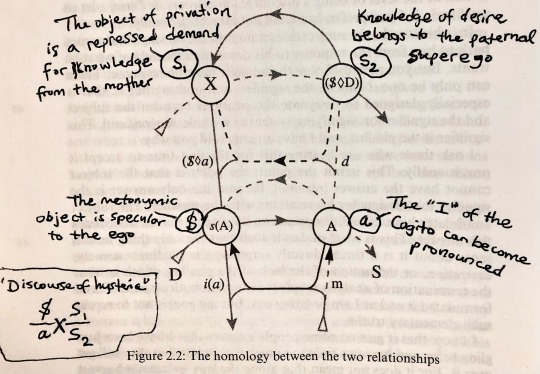
In other words, a counterclockwise turn transforms the representative function of the algebraic letters (that I wrote on the page in pen) for the discourse of hysteria into a master’s discourse. The thinking subject encroaches onto the dimension of castration, because real lack (resulting from the inner intuition of the imagination) and imaginary lack (resulting from cognizing a physical object as something missing or disappeared from reality) cannot inter-deduce from one another’s being thought an imaginable form, within reality, of genuine symbolic lack. Not only is the signal of symbolic lack thereby repressed into a form of primordial anxiety that gets deferred from sexual desire towards the signified of the Other, its representative itself is the very lack of any possibility of an “inter-deduction” between imaginary lack and real lack in the first place for the understanding.
The kind of standing towards sexual desire which the understanding seems to embody, then, is solidified into an abstract personification of the metonymic object for the agency of the ego. Unfortunately for the ego (m), its own desire can never become adequate to any knowledge of sexual desire, which is already prohibited by the paternal superego whenever the demand for knowledge from the mother is repressed (i.e, it becomes explicitly identified as an element within an unconscious system or network of desire). Not to ask for a certain thing in a certain way, for example.
4 notes
·
View notes
Text
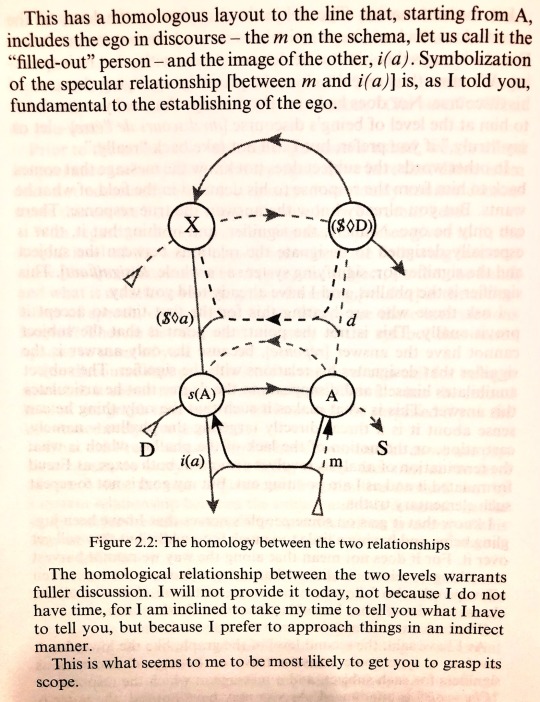
Adding this to the list of things I never knew about the graph of desire: the “homological relationship between the two levels” is both a metaphor for and a literal embodiment of the specular relation in the mirror stage.

“Homological” is an allusion to the field of biology, wherein the body parts of different species of animals may be comparatively studied as forms of a “homology”.
“Specular relation” is an allusion to the field of geometrical optics, whereby the reflected image of a real object whenever it appears on a specifically flat surface is the same size as the original object that is optically reflected. A mirror-image is not always necessarily specular; just think of a fun-house, for example. Solid surfaces, regardless of the degree of their shininess (luster), all possess the material capacity to optically reflect an illuminated image. Even solid concrete, so long as it is flat, projects off of itself a specular image of any other object within its physical range. The problem with noticing this, however, is that the reflected image in the concrete is too dull to be plainly visible.
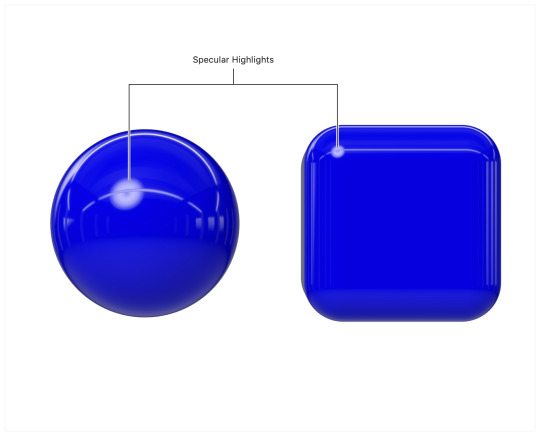
In the image above, the highlights are called “specular”, I believe, because both objects appear to be reflecting an identical source of light, even though their geometrical surface dimensions are different. (This is a principle used in graphic design, I’m guessing.)
0 notes
Text
You cannot recognise an event; because when it is gone, it is gone. You may observe another event of analogous character, but the actual chunk of the life of nature is inseparable from its unique occurrence. But a character of an event can be recognised. … Things which we thus recognise I call objects. An object is situated in those events or in that stream of events of which it expresses the character. There are many sorts of objects. For example, the colour green is an object according to the above definition. It is the purpose of science to trace the laws which govern the appearance of objects in the various events in which they are found to be situated. For this purpose we can mainly concentrate on two types of objects, which I will call material physical objects and scientific objects. A material physical object is an ordinary bit of matter, Cleopatra’s Needle for example. This is a much more complicated type of object than a mere colour, such as the colour of the Needle. I call these simple objects, such as colours or sounds, sense-objects. An artist will train himself to attend more particularly to sense-objects where the ordinary person attends normally to material objects. Thus if you were walking with an artist, when you said ‘There’s Cleopatra’s Needle,’ perhaps he simultaneously exclaimed ‘There’s a nice bit of colour.’ Yet you were both expressing your recognition of different component characters of the same event. But in science we have found out that when we know all about the adventures amid events of material physical objects and of scientific objects we have most of the relevant information which will enable us to predict the conditions under which we shall perceive sense-objects in specific situations. For example, when we know that there is a blazing fire (i.e. material and scientific objects undergoing various exciting adventures amid events) and opposite to it a mirror (which is another material object) and the positions of a man’s face and eyes gazing into the mirror, we know that he can perceive the redness of the flame situated in an event behind the mirror—thus, to a large extent, the appearance of sense-objects is conditioned by the adventures of material objects.
Alfred North Whitehead, The Concept of Nature
22 notes
·
View notes
Text
"We do not know what it [jouissance] is but assume it must be there because we are constantly dissatisfied." The latter part of this excerpt seems to be referring to a more straightforwardly Freudian notion of castration, which is basically defined as the renunciation of total satisfaction in order to enable the possibility of having any partial satisfaction. Partial satisfaction here is chosen over "total" satisfaction simply because it is (socially) understood to be more enjoyable. However, this means that the excerpt above is talking more accurately about castration than about jouissance, and its attempt at insight is therefore rather botched.
Jouissance is rather something that all living things have interactions with precisely because they are in Nature. Jouissance is therefore something internal to nature, and while it is true that it bears a lot more resemblance to what is signified, it isn't at all hard to "actually say what it is", as this excerpt claims. It is also debatable whether or not it really ought to be left untranslated for English usage any longer, since you may as well say the same thing of "enjoyment" as something internal to nature, because all living things have forms of movement (e.g. cellular growth, or even physical travelling) that are peculiar to life-forms specifically, as opposed to non-living matter.
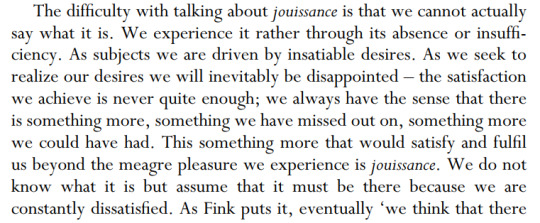
On the difficulty of defining Lacan's concept of jouissance
360 notes
·
View notes
